- Home
- Cormac McCarthy
The Stonemason Page 2
The Stonemason Read online
Page 2
Soldier sits wearily in the sofa and throws his arm across the back of it. Ben sits on the arm of the sofa.
BEN What do you want to do that stuff for?
SOLDIER What stuff?
BEN That telephone business. Trying to get out of school.
SOLDIER Maybe I don't want to go today.
BEN You don't want to go any day. That's not the point. You don't have a choice.
SOLDIER You ain't my daddy.
BEN Is there somebody leaning on you at school?
Soldier drums his fingers on the back of the sofa in a bored fashion.
BEN Is there?
SOLDIER They ain't nobody at that school that I'm scared of.
BEN What happened to your eye the other day?
SOLDIER What other day?
BEN Last week. Week and a half ago.
SOLDIER I done that playin basketball.
BEN Where were you playing basketball? You quit the team.
SOLDIER You think they ain't nobody play basketball cept what's on the team?
BEN Why did you quit?
SOLDIER I don't need the aggravation.
BEN Was it because you didn't make the A team? You would of made it next year.
SOLDIER I don't need to play on no B team.
BEN Everybody starts on the B team. Don't they?
SOLDIER Not everbody.
BEN But most.
SOLDIER That's them, this is me. Ben studies him. He shakes his head.
BEN Your mother's right you know. You're going to get in trouble running around with that bunch of trash.
SOLDIER It ain't nothin to you.
BEN Yes it is.
Ben studies him.
BEN You want to work for me Saturday?
SOLDIER I got other business to tend to.
BEN All right. You want to go out and start the truck?
SOLDIER Where's the keys at?
BEN They're in it.
Soldier gets up and goes back into the kitchen and out the back door. Ben watches him go, then gets up and exits offstage. We hear him go down the steps. In the kitchen Mama is clearing the table. Papaw gets up and goes to his room.
BEN (Offstage) Babe, I'm gone.
Is Melissa awake?
Are you okay?
All right.
I love you.
Ben returns to the living room and enters the kitchen. Soldier comes in the back door stomping the snow off his shoes. Ben goes to the back door and takes his coat down off a peg. He looks outside. Papaw is dressed in his coat and gloves and is standing by the woodstove holding his hat.
BEN Soldier.
SOLDIER What.
BEN I thought you were going to start the truck.
SOLDIER Cain't start it without no keys.
BEN The keys are in it.
SOLDIER No they ain't.
BIG BEN (Without looking up from his paper) The keys is in it.
SOLDIER (Looking from Ben to Big Ben and back again) What truck you talkin bout?
Ben buttons up his coat and pulls his gloves out of his coat pocket and puts on his hat.
SOLDIER I thought you meant the pickup.
BEN You sat right there and heard us talk about Grandad's truck.
SOLDIER You said truck I thought you meant your truck.
BEN (To his grandfather) You ready?
Papaw claps his gloved hands together. Ben gets the thermos of coffee off the sideboard that his mother has put there and returns to the door. The dog looks after him.
BIG BEN You better get you some sand.
MAMA Don't you keep him out in this all day. You hear?
Ben opens the door.
MAMA And let Bossy out.
BEN (To the dog) Let's go.
The dog looks at him.
BEN Let's go, I said.
The dog climbs slowly out of the box and goes to the door and looks out.
BEN Hit it.
The dog goes out. Ben and Papaw turn up their collars and pull on their caps and let down the earflaps. Ben watches the dog out in the snow.
BEN Mama, what are you going to do about this dog?
MAMA Ain't nothin wrong with that dog.
BEN He raises his leg to take a pee and then falls over in it.
MAMA You don't need to be worryin bout that dog. That dog's just fine.
SCENE III
The exterior of the old stone farmhouse. Ben and Papaw bring stones from offstage and pile them among the stones in front of the house. The light comes on at the podium and Ben speaks from there.
BEN To get stone for the house we also pull down old walls that are about to be bulldozed. Often we are given the stone just to haul it away. My grandfather says that you might learn how a watch is made by taking one apart or you might even be able to learn how to build a house by tearing one down. But tearing down stonework tells you nothing. The old masons would quit work if you stopped to watch them, but I don't think you could learn by watching. You couldn't learn it out of a book if there were any and there are not. Not one. We were taught. Generation by generation. For ten thousand years. Now in the memory of a single man it's been set aside as if it never existed. As if it had no value at all. He knows this and yet it seems not to bother him.
Maven is right to be jealous of him. I know that he's going to die and I despise every hour not spent in his company.
The podium light dims to black. At the house Ben goes offstage to bring a stone from the truck. The old man pauses to relight his pipe.
PAPAW I didn't see no school busses out.
BEN (Returning with a stone) Soldier was probably trying to stay out of a school that wasn't going to run anyway. I don't know what to do about him.
PAPAW (Sucking at his pipe and throwing the match aside) Well. They was a boy killed at that school. Maybe he shows pretty good sense.
BEN Maybe you're right. I knew that school was just a drug exchange center so I don't know why I should be surprised now that the murders have started. I know he's making Carlotta crazy.
PAPAW Well, the boy's daddy ain't around.
BEN I think it's his daddy that's most of his problem now.
PAPAW Well. Landry ain't much shakes. But it take a pretty sorry daddy to be worse than no daddy at all.
BEN I take it you don't rate him that sorry.
PAPAW A man that will work they's always hope for him. He can always change his ways.
BEN Well, he does work. What about a man that won't work?
PAPAW (Shaking his head) I don't believe they's nothin you can do for him. If they is I never saw it. (He looks offstage) That's the last one ain't it?
BEN That's the last one. You want some tea?
PAPAW Well that would be all right. Too early to eat dinner.
Ben exits briefly offstage. Sound of the truck door opening and slamming and he returns with the thermos and cups and they sit down on the stones and Ben pours the tea.
BEN So tell me what happened about the man's house.
PAPAW Oh well. They done had it made up to go out there. They wasn't no use to consult with me.
BEN Is that what they call a crowbar lien?
PAPAW Well. I've heard it called that.
BEN But they did it anyway.
PAPAW Oh yes. They went out there and pulled it down. They had some big bars and they pried the stones out of the lower courses till it give way. They was lucky it didn't fall on em.
BEN Did you think they were wrong?
PAPAW I thought the man ought to of paid us what he owed us. Tearin it down didn't get nobody paid though. It didn't benefit nobody.
BEN Maybe it made them feel better.
PAPAW Maybe. I expect it depend on how you feel in the first place. Stonework ain't like somethin you sell to a man and he don't pay you you can take it back. Even a house, you could tear it down and get the lumber. Get the brick. But the mason fits the stones for the place where they're to go and that's where they're at. They ain't nothin to take back. You just has to des
troy it. You destroy you own work you ain't got much use for it to start with, paid or not paid.
BEN Might it not keep somebody else from not paying you?
PAPAW It might. It might keep some from hirin you too. They's lots of work in this world that ain't never paid for. But the accounts gets balanced anyway. In the long run. A man that contracts for work and then don't pay for it, the world will reckon with him fore it's out. With the worker too. You live long enough and you'll see it. They's a ledger kept that the pages don't never get old nor crumbly nor the ink don't never fade. If it don't balance then they ain't no right in this world and if they ain't then where did I hear of it at? Where did you? Only way it won't is you start retribution on you own. You start retribution on you own you'll be on you own. That man up there ain't goin to help you. Ain't no use even to ask.
BEN Is that why you wouldn't go out there with them?
PAPAW No. The reason I wouldn't go out there was just a plain everday reason. No man can lay stone and be thinkin bout whether he goin to have to tear it back down again. Ain't no use to get in no such habits as that. You know that man up there ain't goin to let nothin stand forever noway. Not in this world he ain't. And it's against that judgment that you got to lay stone. If you goin to lay it at all.
BEN So who owns the stonework that's not paid for?
PAPAW Well, under the law you can get a lien on the work. You can claim it, but you cain't take possession of it. The man you built it for, he can take possession of it, but he cain't claim it. The law don't have no answer. Where men don't have right intentions the law cain't supply em. You just at a dead end.
BEN Then no one owns the work?
PAPAW The man's labor that did the work is in the work. You cain't make it go away. Even if it's paid for it's still there. If ownership lies in the benefit to a man then the mason owns all the work he does in this world and you cain't put that claim aside nor quit it and it don't make no difference whose name is on the paper.
SCENE IV
The basement. Ben at his small table. The light comes on at the podium.
BEN Whose work is it? I know that there are stones in that house that his uncle Selman kid up. There's no stone for Selman. He's buried behind the house. Somewhere on the hill. My grandfather's views must incorporate the life of Selman. All Selmans. These views appear to be some labor theory of value. But there's a further agenda. Because the world is made of stone the mason is prey to a great conceit and to whatever extent the look and the shape of the world is the work of the mason then that work exists outside of the claims of workers and landholders alike. Reading Marx in my last year of school only sent me to Hegel and there I found his paradigm of servant and master in which the master comes to suffer the inner impoverishment of the idle while the servant by his labors grows daily in skill and wisdom.
The house was built in 1836 and that date is cut into the lintel stone over the front door. The Telfairs black and white came here from South Carolina in the 1820's. His father and mother were slaves as was his brother Harris, born 1861, and his sister Emmanuelle, born Christmas day of 1862. Seven days before the signing of the Emancipation Proclamation. The stone sills of the cabin where he was born are still there behind the house.
I can remember the house when it had a roof on it. We'd take visiting relatives out there on Sundays when I was a child. There were black people living in it then but I don't know what their name was. I bought the place in 1966, the house and forty two acres in three separate parcels, and I gave him the deed at his one hundredth birthday party four years later. He looked at it for a long time. Nobody knew what it was that he was looking at. It got more and more quiet and finally Carlotta said: "What is it, Papaw?" and he had tears in his eyes and he just handed it to her and looked away.
He had me promise not to disturb the pale renters interred on our farm but I had no intention to do so. He says that for himself we can just throw him out in a sinkhole when he quits this world. But he'll be buried with his ancestors black and white in full possession of the earth whereunder he lies. It balances out, he says. Yes. The arc of the moral universe is indeed long but it does bend toward justice. At the root of all this of course is the trade. As he always calls it. His craft is the oldest there is. Among man's gifts it is older than fire and in the end he is the final steward, the final custodian. When the last gimcrack has swallowed up its last pale creator he will be out there, preferring the sun, trying the temper of his trowel. Placing stone on stone in accordance with the laws of God. The trade was all they had, the old masons. They understood it both in its utility and in its secret nature. We couldn't read nor write, he says. But it was not in any book. We kept it close to our hearts. We kept it close to our hearts and it was like a power and we knew it would not fail us. We knew that it was a thing that if we had it they could not take it from us and it would stand by us and not fail us.
Not ever fail us.
— CURTAIN —
ACT II
SCENE I
Late morning in the kitchen. Ben is standing with a cup of coffee looking out the window. The breakfast dishes are on the sideboard and there is still a plate of biscuits and other things on the kitchen table. Big Ben enters. He is dressed in a double breasted cream colored suit with a gabardine shirt the open collar of which is worn folded down outside the suit lapels. He carries a camelhair overcoat over his arm and a hat in his hand. Soldier comes in from outside stamping the snow from his shoes.
BIG BEN You get the rearview mirror?
SOLDIER Done got it all.
Big Ben rummages in his pocket and comes up with a quarter and doles it out to Soldier and then shrugs himself into his coat and buttons it and turns up the collar and puts on his hat and goes out.
SOLDIER I bet he tips better'n that away from the house.
BEN I bet he does too.
SOLDIER (Looking out the window as the car pulls away) Big Cadillac man.
BEN He worked for it.
SOLDIER What he think I goin to do with a quarter?
BEN Get in half the trouble you would if he gave you fifty cents.
SOLDIER (Turning away from the window) Shit.
Ben looks after him as he crosses the kitchen and exits. He looks out the window and shakes his head.
Ben's wife MAVEN enters the kitchen.
She is dressed in jeans and a sweater. Ben turns and looks at her and smiles.
MAVEN Hi.
She goes to the sink and begins to wash the dishes.
BEN Babe can you still get in those jeans?
MAVEN These are Carlotta's.
BEN Is she bigger than you?
MAVEN Yes, smartie. She's bigger than me.
BEN I don't guess Mama has any jeans does she?
MAVEN Why don't you bring your head over here where I can drub it.
BEN (Smiling) Drub?
MAVEN Drub.
Ben smiles and shakes his head. He drains his cup and brings it to the sink and sets it down and kisses Maven.
MAVEN What are your plans today, Hotshot?
BEN Work on the house.
MAVEN How's it coming?
BEN Why don't you come out and see?
MAVEN I've got a doctor's appointment at eleven.
BEN You could come out this afternoon.
MAVEN Will you build a fire in the fireplace?
BEN The mortar's still too wet.
Maven shakes her head.
MAVEN No deal
BEN I could build one outside.
MAVEN Not the same thing. Are you taking Papaw with you?
BEN Yep.
She looks past him to Papaw's door.
MAVEN Ben don't you think he's a little old to be out in the freezing cold doing stonework?
BEN Well, I think he's old enough to say for himself.
MAVEN What if he died out there?
BEN Maybe he'd prefer it.
MAVEN Your mother would never forgive you.
BEN I know. I've thought about tha
t. It's just a chance I'll have to take.
MAVEN She thinks you don't take care of him. I think you don't take care of him.
BEN I know. He's tougher than you think. Babe I wouldn't take him out there if it didn't mean a lot to him. That's his house. He wants to see it done. He wants to do it. He sees it as some kind of final evidence of justice in the world. For him it's like the workings of Providence.
MAVEN Has he ever said that?
BEN (Smiling) No.
MAVEN Do you think that?
BEN I don't know. Maybe. I think I'd like to.
MAVEN Soldier has his version too. What is it he says? What goes around comes around?
BEN I think what Soldier has in mind is revenge.
MAVEN Mm hm.
BEN (Smiling) Is that what justice is? Revenge?
MAVEN Probably it is for those being treated unjustly.
BEN But the rain falls on the just and the unjust.
MAVEN The rain falls upon the just and also on the unjust fellas. But mostly it falls upon the just. Cause the unjust have the just's umbrellas.
BEN (Smiling) Is that what you learned in school?
MAVEN That's what I learned at my mammy's knee.
BEN Do they talk about justice in your classes or just about the law?
MAVEN Mostly the law. It's a pretty pragmatic business. I think that was an older generation that discussed the philosophy of law.
BEN Probably. Papaw was talking about the law yesterday. He says that law can only work in a just society.
MAVEN He said that?
BEN (Smiling) Well, more or less. It's what he meant anyway.
MAVEN You think his opinions are valuable because he's worked all his life. Isn't that a pretty romantic notion?
BEN Yes. It's also true. You can't separate wisdom from the common experience and the common experience is just what the worker has in great plenty.
MAVEN Then why aren't more workers wise?
BEN I guess for the same reason that more college professors aren't wise. Thinking's rare among all classes. But a laborer who thinks, well, his thought seems more likely to be tempered with humanity. He's more inclined to tolerance. He knows that what is valuable in life is life.
MAVEN And the professor?
BEN I think he's more apt to just be dangerous. Marx never worked a day in his life.

 The Road
The Road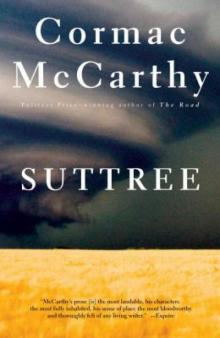 Suttree
Suttree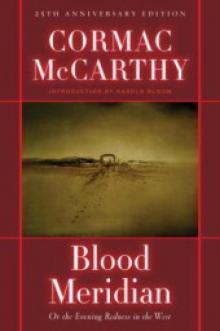 Blood Meridian, or the Evening Redness in the West
Blood Meridian, or the Evening Redness in the West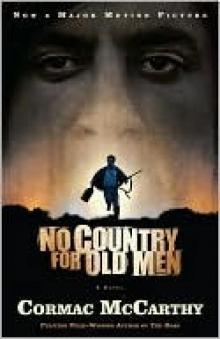 No Country for Old Men
No Country for Old Men The Sunset Limited
The Sunset Limited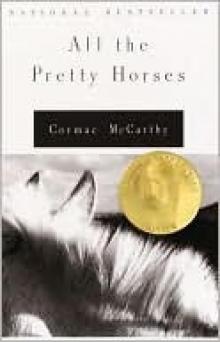 All the Pretty Horses
All the Pretty Horses The Crossing
The Crossing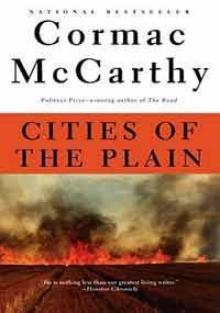 Cities of the Plain
Cities of the Plain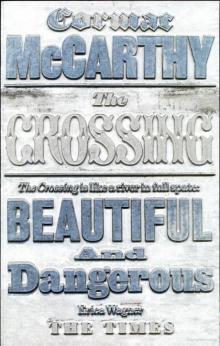 The Crossing tbt-2
The Crossing tbt-2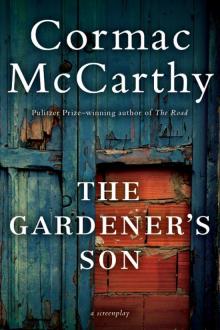 Gardener's Son
Gardener's Son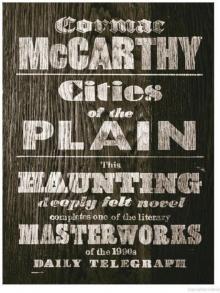 Cities of the Plain tbt-3
Cities of the Plain tbt-3 The Stonemason
The Stonemason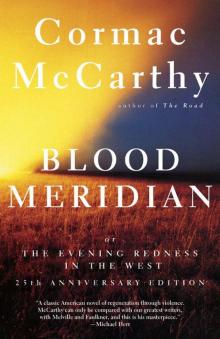 Blood Meridian: Or the Evening Redness in the West (Vintage International)
Blood Meridian: Or the Evening Redness in the West (Vintage International)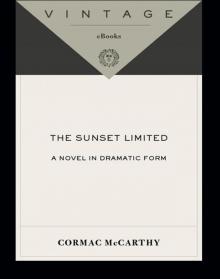 The Sunset Limited: A Novel in Dramatic Form
The Sunset Limited: A Novel in Dramatic Form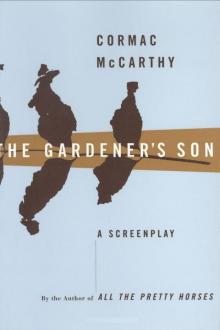 The Gardener's Son
The Gardener's Son